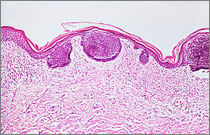Small intestine cancer
| 2020 | ||
|---|---|---|
¹ per 100,000 persons, age-standardised according to the old European standard population * calculated using the period method for 2019 / 2020 | ||
| Women | Men | |
| Incidence | 1,210 | 1,540 |
| Age-standardised incidence rate¹ | 1.7 | 2.4 |
| Deaths | 330 | 417 |
| Age-standardised mortality rate¹ | 0.4 | 0.6 |
| 5-year prevalence | 4,100 | 5,100 |
| 10-year prevalence | 6,900 | 8,000 |
| Relative 5-year survival rate* | 64 % | 59 % |
| Relative 10-year survival rate* | 61 % | 53 % |
About half of the malignant tumours of the small intestine are neuroendocrine tumours (NET), which are also found in other organs of the digestive tract, lungs or skin, albeit less frequently. Gastrointestinal stromal tumours (GIST) account for a good 10 percent of cases in the small intestine. In 2020, a total of approximately 2,750 people, including 1,210 women, were diagnosed with small intestine cancer in Germany.
In about seven out of ten people affected, the diagnosis is made at an advanced stage (UICC III/IV).

![]() Distribution of UICC-stages at first diagnosis by sex, ICD-10 C17, Germany 2015–2016 (top: all cases; bottom: only valid reports)
Distribution of UICC-stages at first diagnosis by sex, ICD-10 C17, Germany 2015–2016 (top: all cases; bottom: only valid reports)
5-year survival rates for both GIST and NET are higher than for other malignant small intestine tumours.
Hereditary diseases increase the risk of disease
Little is known about risk factors for NET of the small intestine. Hereditary diseases such as Lynch syndrome, Peutz-Jeghers syndrome, familial juvenile polyposis and cystic fibrosis as well as chronic inflammatory bowel diseases (Crohn's disease) increase the risk of adenocarcinomas of the small intestine. Patients with Neurofibromatosis type 1 (von Recklinghausen’s disease) have an increased risk of gastrointestinal stromal tumours (GIST) of the small intestine. In addition, a small proportion of these tumours are due to a hereditary predisposition (familial GIST syndrome).
Date: 21.03.2024






